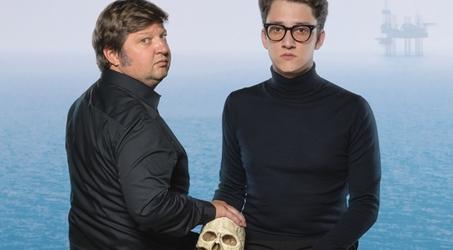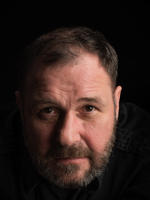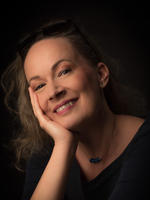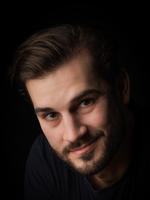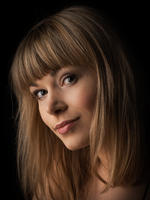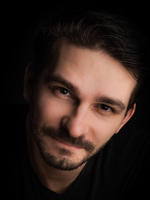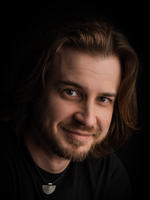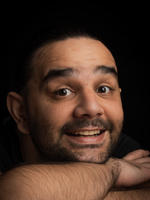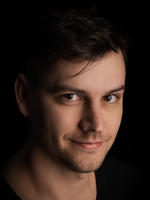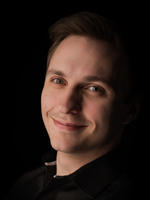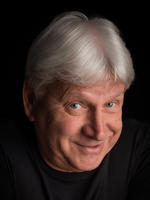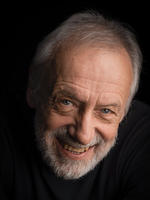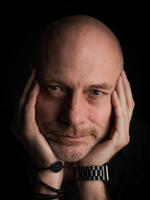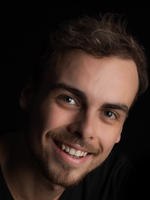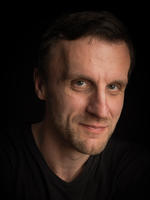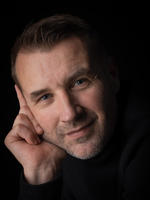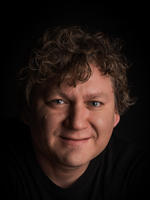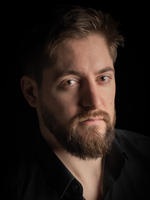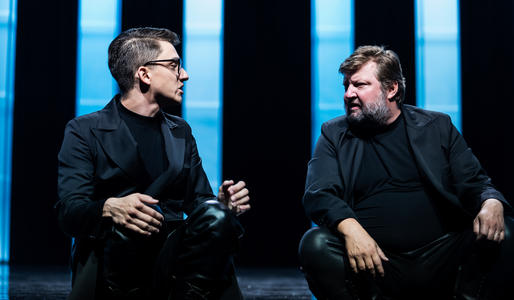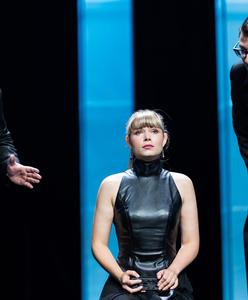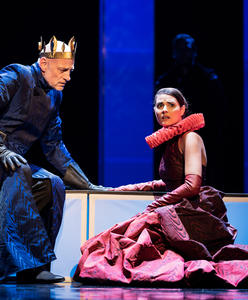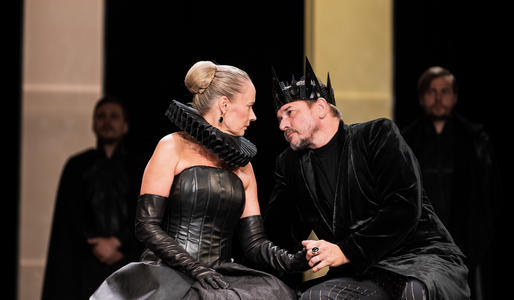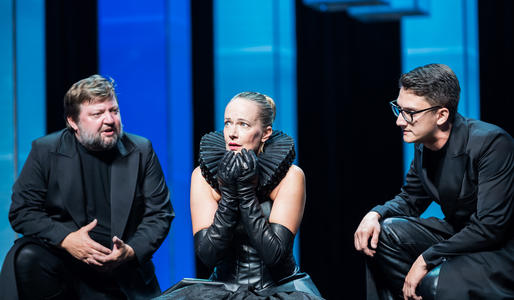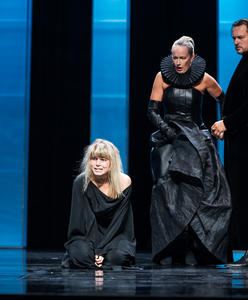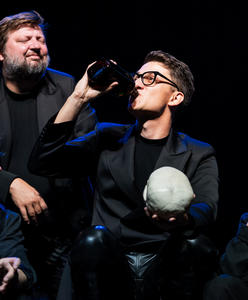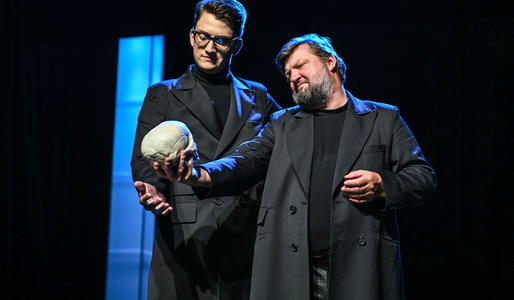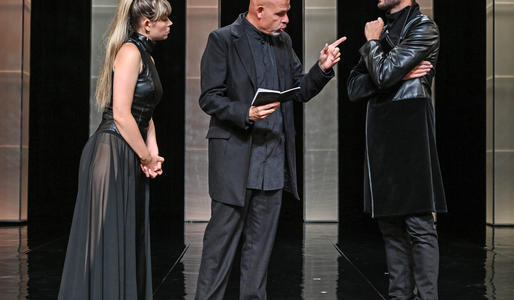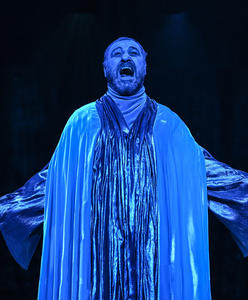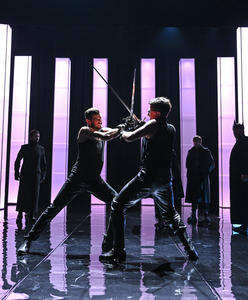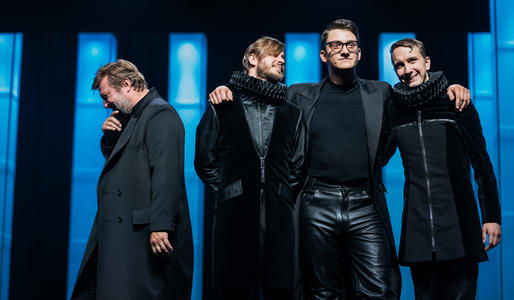In Brno, there are two Hamlets on one stage
Jan Trojan 15. September 2023 zdroj www.brnozurnal.cz
The first premiere of the new season at the Brno City Theatre
All theatre lovers in Brno know that the Brno City Theatre (MDB) has two Hamlets. Even those who haven’t seen this great show yet. The information spread very quickly. That is, two Princes of Denmark in one play. Hamlet I and Hamlet II. The original idea came from theatre magician, director and theatre director Stanislav Moša. Don’t expect any other eccentricities, there will be no Ophelia with a pregnancy card or anything similar as seen on domestic and foreign stages. Moša, also the author of the adaptation, honours the great Elizabethan.
(…)
The torn title character is much more plastic, his feelings and actions are richer than in the solo Hamlet. Many scenes are more comical (shared gestures and movements), even though the content is serious. Isteník, of course, gives his character a dose of his beautiful, mischievous humour, but not so much as to offend the author or the lovers of his dramas. Mihál’s face looks more serious thanks to the conspicuous glasses. The way the young actor handled the challenging role was pleasantly surprising.
(...) However, without top-notch actors, the audience would not have accepted the demanding and, for many, well-known text. In the Brno City Theatre we have to admire Petr Štěpán in the role of Claudius, Hamlet’s uncle. He reaches the peak in the monologue when Claudius, driven by remorse, speaks to himself about the crime, the murder of Hamlet’s father. The performance of the ghost of the murdered king by Peter Halberstadt is breathtaking. His captivating voice and his well-chosen grey glossy costume complete the package. The thankless role of Gertrude, the queen and Hamlet’s mother, suits Alena Antalová. The cast also includes the striking characters of Viktor Skála’s Polonius and his son Laertes, played by another experienced bard, Kristian Pekar. Eliška Skálová as Ophelia has the opportunity to show her acting skills. Her ramblings are completely believable. Jan Brožek and Rastislav Širila were a good choice as Hamlet’s former classmates Rosencrantz and Guildenstern.
Christoph Weyers, pretty much a regular member of the artistic team, also deserves applause. The stage is bordered by tall, slender, quadrilateral prisms, which are coloured differently according to the situation according to the scenario of David Kachlíř’s lighting design. Bright red in extreme situations, sometimes blue, sometimes white. Towards the end of the play, the attentive spectator hears that they are salt pillars. (“I am dead. Explain to the pillars of salt what has happened here,” says the dying Hamlet I to Horatio. Also played by the great Daniel Rymeš.) Sometimes unexpected pauses in complete darkness, ending with the pillars being lit up sharply, contribute to the dynamics of the performance.
Andrea and Adéla Kučerová dressed most of the characters in black costumes, some of them in imitation leather. Only the two actors and one actress who perform the play in Elsinore, in which they reenact the murder of Hamlet’s father, are dressed in more colourful costumes.
Mirko Vuksanović’s music frames another of Brno City Theatre’s successful performances.
The double torn man is almost perfect
Jana Soukupová 13. September 2023 zdroj MF Dnes
Shakespeare’s most famous drama – Hamlet – about the Prince of Denmark who has to avenge the murder of his father by the prince’s uncle Claudius, who has usurped both Hamlets mother, Queen Gertrude, and the crown, is terribly hard. Not only because of the great monologues and dialogues, the three-hour length and the supremely dramatic construction.
Also because of the general expectation of how the producers and actors, led by the performer of the title role, will handle the notorious piece. In short, only a large theatre with an excellent dramatic ensemble can pull Hamlet off with honour. And now the Brno City Theatre has done it again, and with a very risky solution, casting two actors simultaneously in the title role of Hamlet, and text divided quite fairly between the two performers by director Stanislav Moša. And it has to be admitted that the casting of the young and agile Martin Mihál as more or less Hamlet’s “body” together with the acting matador Michal Isteník as the commenting and teasing Hamlet’s “soul” proved to be a saving grace for MdB, if not the best and perhaps the only possible solution.
Because what one of them couldn’t do in the role, the other filled in. As the handsome and talented Mihál still lacks the charisma, experience and inner truth of Isteník who, because of his age and appearance, cannot himself believably embody the excellent swordsman and seductive prince with whom the beautiful Ophelia falls head over heels in love. Together, however, these two composed a Hamlet such as has perhaps never been seen before. (...) All of this was supported by a really well thought out set of simple light columns by Christoph Weyers and a striking music by Montenegrin composer Mirko Vuksanovič.
Hamlet, or the Soul and Body Fighting: Two Hamlets on one stage
Michal Švanda 12. September 2023 zdroj www.kulturio.cz
Two Hamlets for the price of one, the Brno City Theatre might advertise its latest drama premiere. Director Stanislav Moša decided to underline Hamlet’s internal contradictions and dilemmas by dividing his text between two actors. Martin Mihál represents the typical Hamlet as we imagine him. A thin young man with obvious intellectual traits. Michal Isteník embodies the earthier side of the prince’s character. He often lightens the situation with humour. However, this is not to say that Mihál only has serious lines and Isteník was making fun.
The title – Hamlet or The Soul and the Body Fighting – suggests that the focus will be on a heated dilemma. The question at the forefront is whether to act or not to act rather than whether to be or not to be. Referring to the title of the play, one might say that the body craves action to do justice, but the soul wants to be sure before it exacts revenge. Yet the division of roles between Mihál and Isteník is not so elementary. Which is just as well. The two Hamlets complement each other very well. Their mutual interaction gives the scenes a dynamism that significantly moves the whole performance. In the moments when the other actors address the Danish prince as a character, he is mostly represented by Mihál and Isteník recedes slightly into the background. But he never completely disappears from the scene. Almost always both are present.
The division of the title character into two is not the only unconventional element in the production. Christoph Weyers’ set also catches our attention. It consists only of rectangular columns that light up in different colours. Thus David Kachlíř’s lighting design responds well to the mood or the action taking place on stage. The columns are lowered or raised so that the scene is by no means static. At the same time, the play is virtually without props. These are transported to the stage, or rather discreetly delivered on a case-by-case basis, so that the stage is practically always empty, clean, focused.
It is right that the production has relied on the power of Shakespeare’s text, which it has tried to convey to us in the most compact form in Jiří Josek’s translation. The sparseness of the set and the minimum of props enhanced the importance and impact of the words. This way the imaginative concept did not compete for attention with the text of the play but on the contrary, allowed it to stand out even more.
Viktor Skála also impresses with his performance as the scheming Polonius, who pays the price for his subservience to the powerful. Eliška Skálová is a strong representative of Ophelia, especially in her position as a girl torn between love for Hamlet and obedience to her father. Petr Štěpán as King Claudius emphasizes his outwardly affable mask covering the reckless mannerisms with which he rose to power. But at the same time, in a powerful scene when Claudius tries to deal with his remorse, he manages to show him as a man who is also tormented by doubts about his chosen path. Rosencrantz and Guildenstern are successful parodies of sycophantic dudes who will do almost anything to curry favour with the powerful. (...)
Hamlet – the humble and dynamic Matrix
Josef Meszáros 11. September 2023 zdroj www.scena.cz
“Stop! Answer me! I tell you, speak!” Horacio opens one of the most played tragedies of the English playwright William Shakespeare. Brno City Theatre has set this title for the beginning of the new season 2023/24. HAMLET has become another challenge for the Brno stagers, headed by director Stanislav Moša. (...) The director Stanislav Moša presents the audience with a mature, modern and undoubtedly topical Hamlet. He approaches the text and the actors with great humility. His directorial ideas, which include Hamlet performed by two actors simultaneously, are not elementary, but have their own rationale and meaning. They fit together fundamentally, underlining the interpretation of Shakespeare, but in no way imposing, intruding or pandering. They are simply clear, thought provoking and on point.
The whole structure of Shakespeare’s text is stylistically clean and comprehensive. Stanislav Moša’s interpretation gives order and meaning to all the performances, or images, if you will. All the scenes, without exaggeration and pathos, clearly key Shakespeare’s intention. The production gives you the feeling that you begin to understand Hamlet right from the start.
The whole concept of the production is not based just on the director’s ideas, and again I stress the humble and honest staging, but every component of the production is making its own claim. Whether it’s the “blank” set (by Christoph Weyers) that underscores the words (the Word – and I say that on purpose, because the entire text of Hamlet is truly ingeniously, even brilliantly written). This includes a good translation by Jiří Josek. Let’s return to the stage, because its “emptiness” is filled with simple prisms with a square figure. These change colour and the symbolism and interpretation of the colour scheme (blue, white, red, purple, pink, etc.) comes into play. The prisms are static or dynamic. We almost get the feeling that the digital world of the Matrix is appearing on stage, but mainly this lighting and scenographic purity again underlines the words (the Word).
And we come to the music, because if the stage is “empty”, then the audience must be captured by the costumes, the acting and the music. And the music by Mirek Vuksanović offers not only a musical atmosphere, but sonically illustrates the action on stage with all possible musical mystery, be it musical motifs, instrumental interpretation, but mainly stylistic variety. You can also look forward to rock music and other styles.
The actor always remains at the centre of the production. In the case of the Brno City Theatre, it is clear that all the actors can hear each other, which makes the production very good in terms of sharing. Everyone on stage, no matter what role they are in, is a distinctive actor.
The ghost of the dead king, Hamlet’s father, performed by Petr Halberstadt offers in short not only a challenge to follow the truth, but stands out with an emphatic gesture of a raised hand – not just saying “follow the truth”, but “beware”. Viktor Skála offers a very distinguished Polonius. In the cloud scene, the viewer perceives his spinelessness. In addition, he shows concern for his children, although in the case of his son, his advice is again directed towards false pretence. The same goes for the life advice towards Ophelia. Petr Štěpán, Claudius, plays power games with everyone who comes his way. In the eyes of the viewer, he goes beyond morality. He very expressively flounders in the scene where he confesses his crime. He tries to hold on to power and despite his strength, he is afraid of Hamlet, especially his influence on the people who are very sympathetic to him. Gertrude by Alena Antalová is tormented by her relationship to both brothers. Although her motive for following her husband’s brother immediately after his death does not surface, we can still discern her concern for her son Hamlet. It is the strongest at the end of the production when she sacrifices herself for him.
Michal Isteník and Martin Mihál as Hamlet. Despite all the fears that the doubling of the main character will be fake, it is not. Each of them has a different acting experience, which makes their Hamlet more interesting and impressive to say the least. The division of their lines, scenes and gestures is so natural and perfectly timed that you will admire this directorial trick. Hamlet’s meeting with his mother takes on new dimensions. She kneels on the proscenium, dejected, and Hamlet – Michal Isteník and Martin Mihál – present her actions from both sides. And suddenly the dialogue between Gertrude and Hamlet (meaning one actor) becomes a dialogue of remorse. And conscience is relentless and crushes everyone from all sides. And this “trialogue” has done just that.
The duel of Laertes (Kristian Pekar) versus Hamlet is also a success in terms of movement, not only in the visual conception, when it is not a thunderous duel with swords, but a nerve-wracking duel in hints, all the more impressive when both actors (Michal Isteník and Martin Mihál) work together, whether with sword or words.
(...) So how is Hamlet in Brno? Definitely Moša’s, just like the one at the Smetana Theatre in the 1980s was Macháček’s. Thank you. And all you have to do is stop, answer and talk.

